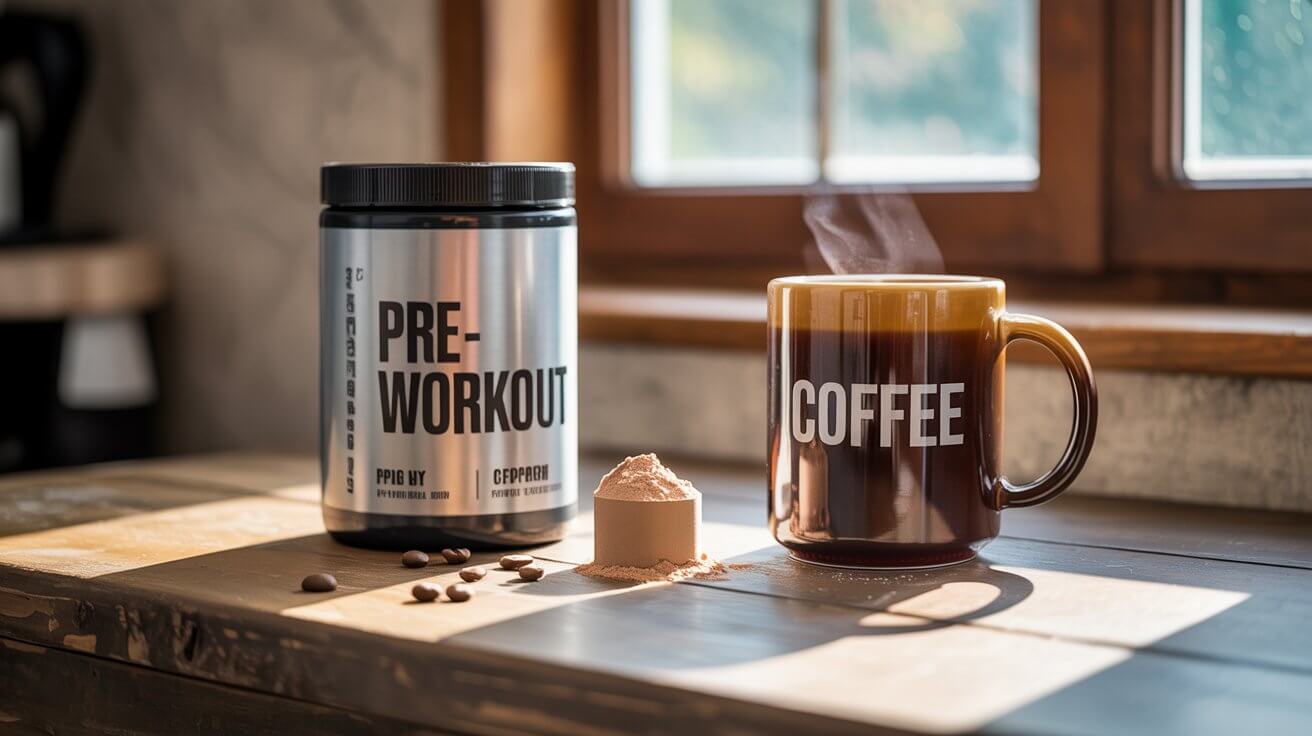Pre-Workout vs Coffee: Compare energy boosts, benefits, and effects to choose the best option for your workout or daily routine.
Feeling tired before a workout and wondering what will actually get you moving? You’re definitely not alone. You want that energy kick—the kind that gets you pumped, focused, and ready to crush your gym session. But choosing between a cozy cup of coffee or a colorful scoop of pre-workout powder can leave you scratching your head.
Both choices promise more energy, sharper focus, and better performance. But do they really work the same? Coffee is simple, natural, and full of antioxidants. Pre-workout is packed with extra stuff meant to fire up your body and last longer. So, which one gives you the real edge—and which one could backfire if you’re not careful?
Also, you’ve got to watch out for side effects, sneaky additives, and your own caffeine limits. No one wants jitters, tummy trouble, or a restless night after leg day. In this guide, you’ll see exactly how coffee and pre-workout measure up for energy, endurance, and safety. Plus, you’ll get smart tips for picking what fits your routine, goals, and budget. Ready to find your perfect pre-workout boost? Let’s dive in.
The Role of Caffeine: The Common Link Between Coffee and Pre-Workout
Let’s build on what we touched on earlier—there’s one big reason both coffee and pre-workout give you that energy kick: caffeine. This natural stimulant is at the heart of both options, powering up your body and mind when you need it most. But how exactly does caffeine work, and how much should you take for the best workout results? Let’s break it down together.
How Caffeine Boosts Energy and Performance: Mechanism of Action
Honestly, caffeine’s magic is pretty cool. It works by blocking a chemical called adenosine in your brain. Adenosine usually makes you feel sleepy as the day goes on. When caffeine gets in there, it prevents that sleepy feeling and sharpens your focus.
You’ll notice you feel more awake, alert, and ready to tackle that workout. According to a 2021 International Society of Sports Nutrition review, caffeine not only perks you up, but it’s also classified as an “ergogenic aid”—that means it boosts your actual sports performance, not just your mood.
Recommended Caffeine Dosage for Exercise
Now, how much caffeine do you need to actually feel a difference in your workout? Research is crystal clear here: the sweet spot is between 3–6 mg per kilogram (kg) of body weight. For context, if you weigh 150 pounds (about 68 kg), that means roughly 200–400 mg of caffeine for maximum benefits.
The performance perks include more strength, longer endurance, and even better fat burning (as shown in several 2022 studies). Going over that amount? You might just get the jitters and not see extra gains, so don’t push it.
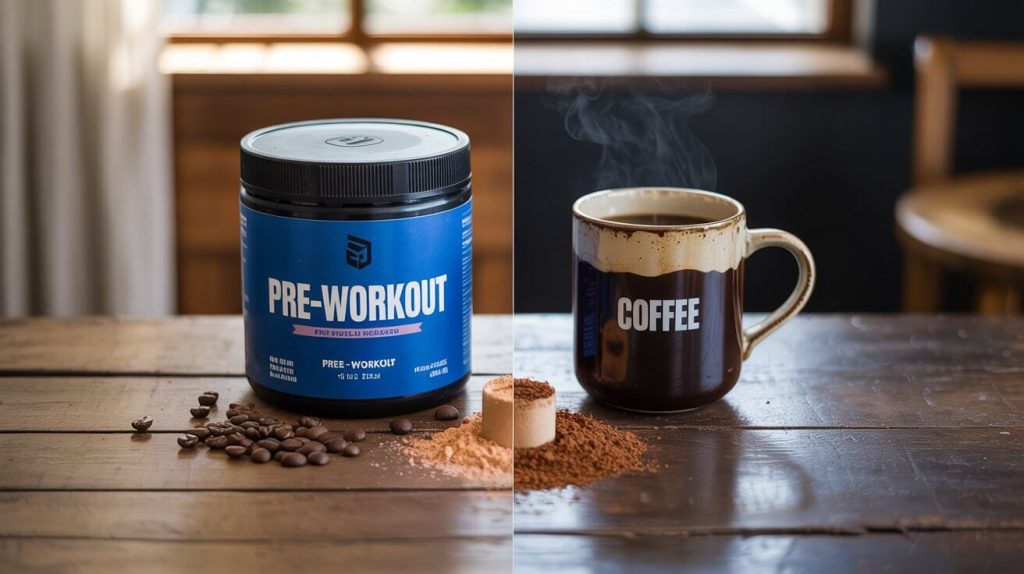
Caffeine in Popular Coffee Types
If you’re getting your boost from coffee, the caffeine level depends on what—and how much—you drink:
1. Drip coffee (8 oz): About 95 mg caffeine
2. Espresso (1 shot): About 64 mg
3. Espresso (double): Around 125 mg
4. Cold brew (8 oz): Ranges from 100–216 mg (varies by brand)
5. Nitro cold brew (8 oz): Usually 143–240 mg
Want a big hit fast? Go for a double espresso. Prefer something smooth and steady? Cold brew is a great, high-caffeine option that’s also gentler on your stomach.
Caffeine Content in Pre-Workout Supplements
Pre-workout gives you a much more precise dose. Most formulas pack between 150–300 mg of caffeine per serving—so, about the same as two to three cups of drip coffee (but in a small scoop). This is helpful if you want to know exactly how much caffeine is going into your system.
Some pre-workout brands, like BUM ESSENTIAL or THAVAGE, are built right in that 200 mg range for a solid, lasting effect.
Quick tip:Stick with 1 serving of pre-workout or 1–2 cups of coffee to hit the suggested range.
Now that you know caffeine’s starring role—and how different drinks deliver it—it’s time to look at what else is inside these popular energy boosters. In the next section, we’ll dig into the unique ingredients and formulations that set coffee and pre-workout supplements apart.
Key Differences in Ingredients and Formulation
Coming off our deep dive into caffeine, let’s zoom out and look closer at what actually sets coffee and pre-workout apart. Sure, caffeine is the engine that gets you going, but the rest of the ingredients matter a lot too. Here’s where you really start to see the differences—both in what’s inside and how each formula affects your body and performance.
Coffee: Antioxidants, Low Additives, and Simple Ingredient Profile
Coffee is honestly about as simple as it gets. If you stick with black coffee, you’ve got just one main ingredient: coffee beans and water. This means less guesswork about what you’re putting into your body. And that simplicity has perks—no mysterious blends, hidden fillers, or odd flavors.
But don’t let its basic profile fool you. Coffee is naturally loaded with antioxidants, especially chlorogenic acid, which support your metabolic health and help fight off inflammation (per Nutrition’s 2022 review and Trends in Cardiovascular Medicine, October 2022).
These antioxidants aren’t just for show; they play a role in reducing muscle soreness and aiding recovery. That’s why so many athletes and weekend warriors reach for cold brew or a quick espresso before getting sweaty.
Plus, you call the shots: want it stronger? Brew it longer or pick a lighter roast. Want less caffeine? Switch to a smaller serving or a darker roast. Just avoid loading it up with sugar or heavy cream, as these can cause crashes or tummy issues during your workout.
Pre-Workout: Amino Acids (BCAAs, Beta-Alanine), Creatine, Citrulline, B Vitamins
Now, pre-workout supplements are a whole different beast. Think of them as a science-lab mix made specifically for gym lovers chasing an edge. Most pre-workouts combine 150–300 mg of caffeine *plus* a blend of performance boosters:
1. Beta-Alanine: Combats muscle fatigue, often giving that prickly, tingling feeling.
2. Creatine: Supports strength, power, and muscle growth.
3. Citrulline (and sometimes beetroot): Promotes blood flow and those satisfying muscle pumps.
4. BCAAs: Amino acids like leucine, isoleucine, and valine, aimed at muscle recovery.
5. B Vitamins: Help turn food into energy, supporting endurance and focus.
6. Other Extras: Sometimes l-carnitine (for fat burning), adaptogens (for stress), electrolytes, or even nitrates for more endurance.
Of course, every brand’s mix is different, so it’s important to read those labels. The payoff? You get a fast, tailored energy boost, sometimes with real improvements in muscle endurance and fatigue resistance—perfect for high-intensity workouts or days when you want to push harder, as shown in the JISSN 2018 review.
Precision Dosing and Standardization in Pre-Workout vs Coffee’s Variability
Here’s a big reason pre-workout works so well for some people: you know *exactly* what you’re getting. Most brands list their doses, so you can be sure you’re getting 200 mg caffeine, 4 grams beta-alanine, or 5 grams creatine per scoop. This level of precision means less guesswork and more consistent results, making it easier to dial in your doses as your body adapts.
Contrast that with coffee. Even if you make it the same way every time, the caffeine can swing from 95 mg in drip coffee to over 200 mg in a strong cold brew. Bean type, grind size, and brew time all play a role. So, if you want repeatable results, pre-workout can be more predictable—while coffee keeps things a bit more relaxed (and sometimes unpredictable).
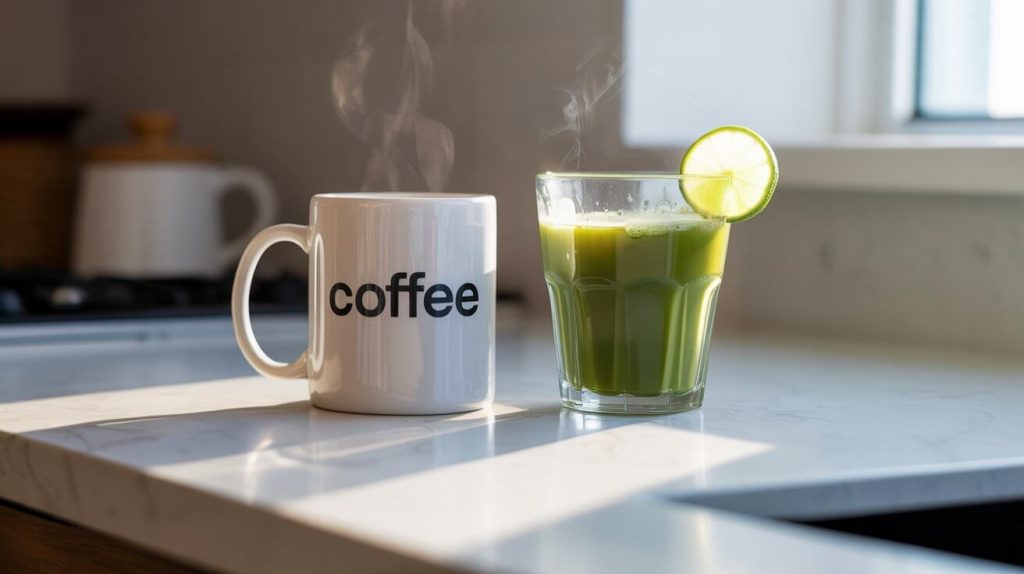
Concerns Over Artificial Sweeteners, Proprietary Blends, and Additives in Pre-Workout
Of course, pre-workout’s complexity comes with some caveats. Not all those ingredients are helpful—or even safe—for everyone. Many products rely heavily on artificial sweeteners, synthetic colors, or “proprietary blends” that hide exact ingredient amounts (as discussed in the 2019 Nutrients study).
That can make it tricky to track what you’re really consuming, especially if you’re trying to avoid certain additives.
Some people don’t react well to certain pre-workout ingredients, whether it’s the artificial sweeteners that upset your stomach or beta-alanine’s tingle that drives you crazy. Plus, unlike coffee, some supplements may also sneak in extra stimulants or fillers, which can introduce extra risks. That’s why experts and trainers always remind you to check for third-party testing and solid brand reputation before buying.
Building on this clearer picture of what’s in your cup or shaker, let’s now see how these ingredients actually deliver on performance—everything from endurance to fat burning and recovery—in our next section.
Performance and Health Benefits
Building on our look at ingredients and dosing, it’s time to dig into what actually happens when you drink coffee or take pre-workout before hitting the gym. After all, it’s not just about a quick jolt—it’s about how these choices impact your performance and health long-term.
So, how do coffee and pre-workout stack up when it comes to endurance, strength, fat-burning, and even your heart? Let’s break the science down simply.
Coffee: Endurance, Fat Oxidation, Antioxidant Perks, and Heart Health
Coffee’s performance boost goes beyond caffeine. Studies show that 3–6 mg of caffeine per kg of body weight (about 1-4 cups for most people) can improve endurance (Nutrition, May 2022).
You’ll feel less tired, push harder, and your body will actually burn more fat for fuel—a bonus if fat loss is among your goals. That’s the “fat oxidation” perk researchers love to cite.
Coffee is also packed with chlorogenic acid and other antioxidants. According to reviews from 2022 and even 2024, these compounds do more than speed recovery—they lower inflammation and support overall health.
Regular coffee drinking (2-3 cups a day) is linked with a lower risk of heart disease, stroke, and type 2 diabetes (Trends in Cardiovascular Medicine, Oct. 2022). Not bad for something that costs less than 50 cents a cup.
Coffee is especially good for steady-state cardio, morning jogs, or anyone looking for a boost without the extra “chemistry set” of ingredients. If you prefer a smooth energy lift and like knowing exactly what’s in your mug, coffee’s simplicity and health profile are hard to beat.
Pre-Workout: Enhanced Strength, Blood Flow, and Faster Recovery
Pre-workout, on the other hand, is made for the gym-goer hungry for more than just steady energy. With its blend of caffeine plus performance enhancers—like beta-alanine (for fighting muscle fatigue), creatine (for strength and muscle gains), and citrulline (for juicy pumps), you’re getting a lot more than just a wake-up call.
Evidence from the Journal of the International Society of Sports Nutrition (2018) shows multi-ingredient pre-workouts can hike up your muscular endurance, training volume, and even mood. If you want to squeeze out extra reps, recover faster, or smash out a tough HIIT (high-intensity interval training) session, a well-formulated pre-workout can definitely take you further.
But, you’ve got to watch the label. Not every blend meets clinical dosages, and some ingredients—like BCAAs—might not give major muscle gains if you’re already eating enough protein (see 2024 reviews). For tried-and-true results, look for formulas with at least 4 g of beta-alanine and 3–5 g of creatine per serving.
Moderate vs. High-Intensity Workouts: Who Wins?
Here’s where your goals really matter. For moderate exercise—think endurance runs, brisk walks, or steady cycling—coffee often does the trick. It boosts alertness, increases fat burning, keeps you sharp, and supports your heart.
But for high-intensity workouts—heavy lifting, CrossFit, sprints, or anything pushing your limits—pre-workout tends to pull ahead. Those added ingredients mean more muscle power, better blood flow for nutrient delivery, and shorter recovery times. You’ll notice a difference especially on days when you’re lifting to failure, trying to PR, or going for those last brutal minutes of a spin class.
Weight Loss and Fat Metabolism
Both options can support weight loss, but in slightly different ways. Coffee helps your body use fat for fuel, especially if you work out in the morning or train fasted. Just one or two cups pre-workout can gently raise your metabolism and suppress appetite a bit, according to multiple studies from 2022 and 2024.
Pre-workout sometimes includes extra fat-burning compounds like L-carnitine or even green tea extract, aiming to up your fat metabolism further. Still, caffeine is the main mover here for both.
If you’re looking mainly to burn fat, coffee keeps it natural—no mystery blends needed. If you want to ramp up your metabolism and combine ingredients that might act together, pre-workout could deliver a slight edge, as long as the mix is clinically backed.
Now that you’ve seen how performance and health stack up, you might be wondering about the flip side. What about side effects or risks? In the next section, we’ll look at potential drawbacks, from jitters to digestive trouble—and how you can stay safe choosing your energy boost.
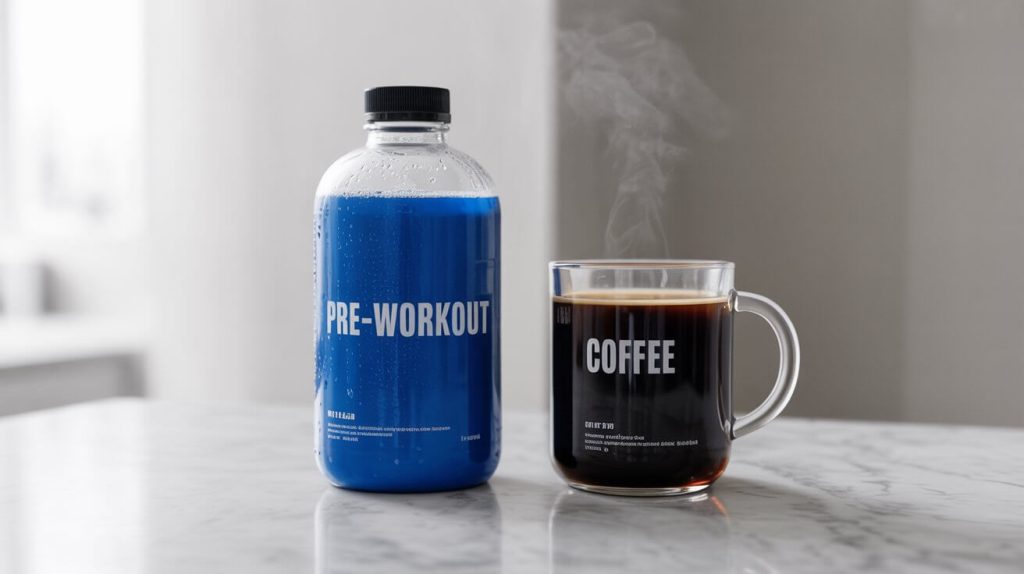
Potential Drawbacks and Side Effects
Now that you’ve seen the impressive benefits coffee and pre-workout can bring, let’s dig into the other side—the potential drawbacks and side effects. It’s important to know what you might experience, especially once you start looking beyond just caffeine. These effects can impact your energy, comfort, and even safety both during and after your workout.
Coffee: Jitters, Anxiety, Heart Palpitations, Sleep Disruption
Coffee’s side effects are pretty familiar to most people, but they still matter—especially if you go overboard. Too much coffee, or drinking it too late in the day, can leave you feeling jittery, anxious, or scattered. According to Garage Gym Reviews (2024), shakiness, a racing heart, and even heart palpitations often show up if you’re sensitive to caffeine or push past your personal limit.
Sleep can take a hit too. The caffeine in coffee can linger for several hours, making it harder to wind down—even if you worked out hours earlier. The same review notes higher blood pressure and trouble focusing as other possible effects, especially if you regularly drink above 400 mg of caffeine per day (that’s about four cups of drip coffee).
Digestive woes can also be an issue. Hot black coffee, while great for kickstarting digestion, might irritate your stomach or cause reflux for some people. Cold brew, as discussed earlier, tends to be softer on sensitive stomachs, but you’ll still want to watch your total intake.
Pre-Workout: Tingling, Nausea, Rapid Heart Rate, Higher Risk of Side Effects
Pre-workout supplements come with their own set of unique side effects, many tied to the “extras” they contain. Remember the beta-alanine we talked about? This ingredient commonly causes tingling or a prickling feeling (paresthesia) in your skin—harmless, but potentially uncomfortable for some.
An April 2019 study in Nutrients found up to 54% of pre-workout users reported symptoms like nausea, quickened heartbeat, dizziness, and even skin rashes.
That’s a much higher side effect rate than coffee. These issues can get worse if you take more than the recommended serving, combine with other caffeine sources, or are sensitive to certain ingredients like niacin or artificial sweeteners.
Women’s Reported Higher Likelihood of Side Effects from Pre-Workout
Interestingly, the same 2019 Nutrients study highlighted that women seem more likely than men to have side effects from pre-workout—despite usually consuming lower doses. Symptoms tend to spike if you double scoop, stack supplements, or have underlying sensitivities. It’s a clear reminder to always start with a single dose and pay attention to how your body reacts.
Over-Dependency, Label Transparency, and the Importance of Third-Party Testing
It can be tempting to rely on pre-workout (or even coffee) every day—but over time, you might start needing ever-increasing doses just to feel the same “kick.” This is called building a caffeine tolerance, and as Organic Muscle (2024) notes, it can lead to dependency, masking real fatigue and even risking overtraining.
Another big concern? What’s actually in your pre-workout tub? Unlike coffee, pre-workout supplements aren’t tightly regulated.
Some brands use proprietary blends, hiding exact dosages and making it tricky to track your intake. The experts at Garage Gym Reviews urge you to choose products with clear labeling—and even better, third-party testing to make sure what’s listed is accurate and safe.
Artificial sweeteners, untested additives, or hidden stimulants can also cause digestive trouble, rashes, or other unwanted reactions. Brands like Organic Muscle focus on clean, organic ingredients for this reason, but no matter what, double-check for transparent, trustworthy brands!
Knowing the risks can help you make smarter choices and avoid discomfort. In the next section, we’ll tie it all together—giving you practical tips to help you decide when to pick coffee, when to grab pre-workout, and how to choose what works best for your goals, budget, and lifestyle. Ready to find your fit? Let’s wrap it up.
Choosing the Right Option: Practical Considerations and User Profiles
Now that you’re crystal clear on the upsides and downsides of both coffee and pre-workout, it’s time to get personal. Picking the best energy booster really comes down to your goals, body, preferences, and even your budget. Not everyone needs the same kick—or the same ingredients—to make the most of their workout. Let’s walk through when each option shines, plus tips from real fitness coaches and study-backed guidelines.
When to Use Coffee: Natural, Affordable, Best for Moderate Energy or Endurance Workouts
Building on the earlier benefits of coffee, fitness experts like Jordan Hosbein (NASM-CPT) consistently recommend standard black coffee for people who want a simple, moderate lift.
It’s ideal if you’re gearing up for jogs, steady-state cardio, long walks, or even a light gym session. Coffee’s caffeine boost helps kickstart your focus and alertness, especially if you work out in the morning or need a gentle nudge after a tough day (“Coffee is best for people who need a small boost or to kick-start their day,” says Hosbein, Aaptiv, 2023).
Not a fan of complicated labels? Black coffee wins, hands down. You avoid artificial sweeteners, hidden fillers, and mystery flavors. Plus, with costs averaging just $0.25 a serving (Garage Gym Reviews, Feb 2024), your wallet will thank you.
Studies highlight that even lower doses (0.9–2 mg/kg) can benefit endurance (Nutrition, May 2022). That means one to two cups works for most. And because coffee delivers antioxidants like chlorogenic acid, you get anti-inflammatory support for recovery and heart health—a perk if you’re in for the long game.
When Pre-Workout Makes Sense: Complex Training, High-Intensity Workouts, Need for Added Ingredients
On the flip side, if you regularly tackle intense resistance training, CrossFit, sprints, or want to push through fatigue, pre-workout can make a real difference. As we discussed earlier, these products are formulated with more than just caffeine: you get extra muscle support from beta-alanine, creatine, BCAAs, and compounds like L-citrulline for juicy pumps and blood flow.
These added ingredients matter most when your training needs go beyond what caffeine alone provides (Organic Muscle, Sept 2024). For instance, creatine and beta-alanine support heavy lifts, explosive movements, and longer sessions—aimed right at people who want a competitive edge, not just a wake-up jolt.
Pre-workouts also shine if you want precise, predictable effects. Each scoop is clearly labeled with its content. This is key if you’ve ever felt coffee’s hit-or-miss intensity or want to match your caffeine dose exactly to sessions where intensity matters.
Type of Coffee and Timing: Best Practices for Energy, Digestive Comfort, and Avoiding Crashes
Remember those side effects and digestive quirks we covered? Your choice of coffee and timing can make or break your pre-workout buzz. For the smoothest results:
1. Drink your coffee about 30–60 minutes before your workout. This lets the caffeine hit just as you hit your warm-up (Impulse Coffees, Jan 2025; Garage Gym Reviews, 2024).
2. Choose cold brew if you have a sensitive stomach—its lower acidity means fewer digestive upsets before you exercise (Before You Speak Coffee, May 2025).
3. Go for a double espresso or a light roast drip if you need a fast, concentrated hit.
4. Skip heavy cream, sugary syrups, or fatty add-ins—they slow caffeine absorption, can cause stomach issues, and may blunt your energy boost during exercise (Garage Gym Reviews, 2024).
5. Always pair your coffee with water since caffeine can be mildly dehydrating.
Budget, Convenience, and Ingredient Transparency: Weighing Long-Term Choices
Let’s be honest—you train more than once, so think long-term. Coffee is budget-friendly, needs no fancy shakers, and you know exactly what’s inside. Perfect if you want quality without extra cost or surprises. Pre-workout, while pricier (up to $2.25 a scoop), can pack more into each serving—making sense if you value ingredient combos for peak performance.
Ingredient transparency is crucial.
If you go the pre-workout route, stick with reputable brands that list all ingredients and use third-party testing (Carbon Performance, July 2025; Garage Gym Reviews, 2024). You’ll avoid the risk of unwanted stimulants, allergens, or artificial extras.
Who Should Avoid Each?
If you’re sensitive to caffeine or prone to anxiety, stick with moderate doses—one cup of coffee, or half a scoop of pre-workout is usually enough. For late-night exercisers, stim-free pre-workouts or plain coffee earlier in the day are safest for your sleep.
Personalize, Don’t Overdo
Ultimately, it’s about what fits your body, your workouts, and your wallet. Listen to your body, consult a fitness or healthcare pro if you’re unsure, and remember—there’s no one-size-fits-all. Both coffee and pre-workout have a rightful place when used with care. Find your fit, stick with what feels good, and adjust as your routine evolves.
Ready to put this wisdom into action? Your perfect pre-workout boost is the one that works for YOU. Now, go crush that next session!
Let’s wrap up your search for the perfect energy kick before your workout. Both coffee and pre-workout revolve around caffeine, giving you that power boost and sharper focus. Coffee stands out for its simplicity, rich antioxidants, and easy customizability—perfect for steady cardio, moderate sessions, or those seeking a cleaner option with fewer side effects.
On the other hand, pre-workout was built for intensity: it combines precise doses of caffeine with muscle-boosting extras like beta-alanine, creatine, and B vitamins, delivering stronger pumps, longer endurance, and shorter recovery when you’re pushing your limits.
But there’s no escaping the risks: pre-workouts may trigger more pronounced side effects—tingling, nausea, or sleep issues—especially for women and anyone with caffeine sensitivity. Coffee can cause jitters and disrupt sleep, too, if you overdo it.
So, your best option boils down to your goals, tolerance, budget, and the workouts you chase. Want a natural, affordable boost? Coffee’s your pick. Need a performance edge for high-intensity days?
Go pre-workout—but choose reputable brands and read those labels. Listen to your body, stay within your limits, and remember: your energy boost should work for you, not against you. Ready to crush your next session? Go fuel up and own it!
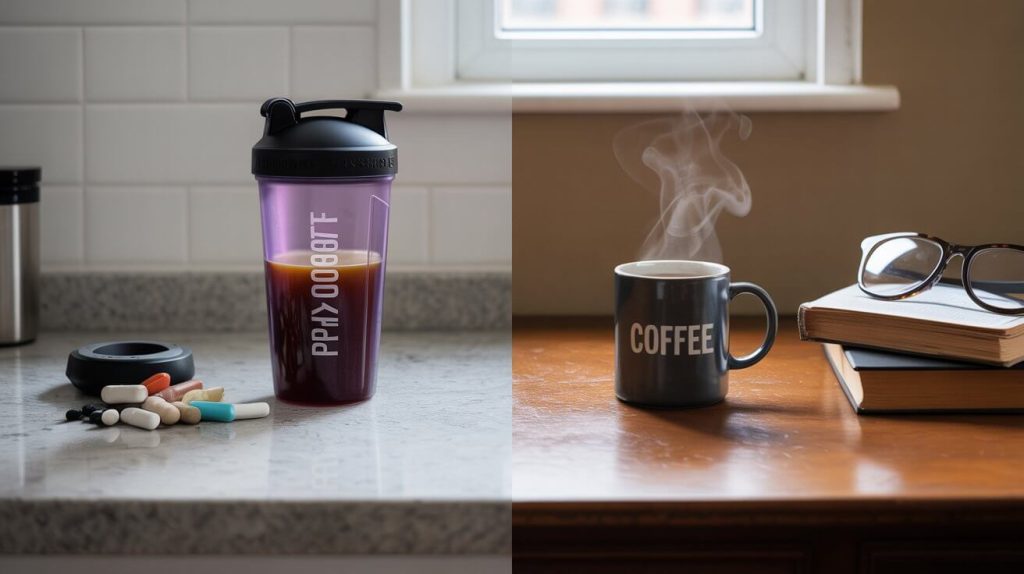
Frequently Asked Questions
Can you use both coffee and pre-workout on the same day?
Yes, but be careful not to exceed 400 mg of caffeine total to avoid jitters or sleep problems. If you do choose to use both, space them out several hours apart and monitor how your body reacts, especially to avoid overlapping side effects like rapid heart rate or stomach upset.
Can you get the same workout benefits from decaf coffee?
Decaf coffee does not deliver the performance-boosting effects of regular coffee because it contains very little caffeine. While it still offers antioxidant benefits, you won’t get noticeable energy or endurance gains for your workouts from decaf alone.
Can you make your own pre-workout at home?
Absolutely! Many people mix ingredients like black coffee (for caffeine), a small banana (for carbs), and a pinch of sea salt (for hydration). For added muscle support, athletes sometimes add creatine or beta-alanine powders separately, allowing you to control dosing and avoid artificial additives.
Can women safely use pre-workout supplements?
Women can use pre-workout, but studies show they may be more likely to experience side effects like nausea or tingling even at lower doses. Starting with half a serving and watching for any unwanted symptoms is the safest approach.
Can switching from pre-workout to coffee help with caffeine tolerance?
Yes, using only coffee or taking caffeine breaks (cycling off) can help reset your body’s sensitivity. This means that, over time, you’ll likely feel a stronger energy boost from lower amounts again, reducing the need to keep increasing your dose.
Can the type of coffee you choose make a difference for workouts?
Definitely. Cold brew is less acidic and often higher in caffeine, making it gentler on sensitive stomachs but still effective. Espresso delivers a fast, strong boost, while drip coffee offers moderate, steady energy. Choose the one that matches your tolerance and pre-workout needs.

